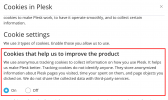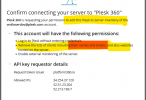Yesterday a customer brought to our attention that while surfing the Plesk GUI connections are being made by the browser to firehose.us-west-2.amazonaws.com. This took me by surprise, because I had never seen it before myself although I am working at least 900 hours annually in and with the panel.
I see that "User Activity Tracking" was first mentioned on the forum in an old thread that dealt with other panel options:
 talk.plesk.com
talk.plesk.com
A support article showed up:
So obviously there has been a change that requires users to explicitely disable "User Activity Tracking" in panel.ini if they do not want it. I did not find any place where the option is explained, so it remains unclear what is tracked and what is done with the data that is created by that tracking. What does User Activity Tracking do? At least it is nothing that is needed, and unfortunately it is an issue for GDPR in the European Union, because we'd need to list transmission of and storage of user data on a non-EU server in the GDPR policies.
So for you folks that have not yet noticed that the GUI is transferring data to an unwanted external target, you can and should disable User Activity Tracking by this entry in panel.ini:
I see that "User Activity Tracking" was first mentioned on the forum in an old thread that dealt with other panel options:
Question - Disabling Facebook integration (backend)
Hello, I noticed, that facebook like button is included in Plesk Onyx's backend, Due to privacy laws I must disable this functionality: It's almost illegal to transfer user data to facebook without explicit consent. How can I do so? Thanks, Jan Code...
 talk.plesk.com
talk.plesk.com
A support article showed up:
So obviously there has been a change that requires users to explicitely disable "User Activity Tracking" in panel.ini if they do not want it. I did not find any place where the option is explained, so it remains unclear what is tracked and what is done with the data that is created by that tracking. What does User Activity Tracking do? At least it is nothing that is needed, and unfortunately it is an issue for GDPR in the European Union, because we'd need to list transmission of and storage of user data on a non-EU server in the GDPR policies.
So for you folks that have not yet noticed that the GUI is transferring data to an unwanted external target, you can and should disable User Activity Tracking by this entry in panel.ini:
Code:
[userActivityTracking]
enabled=false
Last edited:



